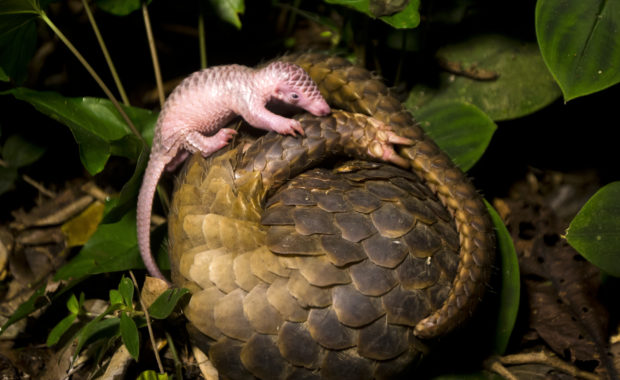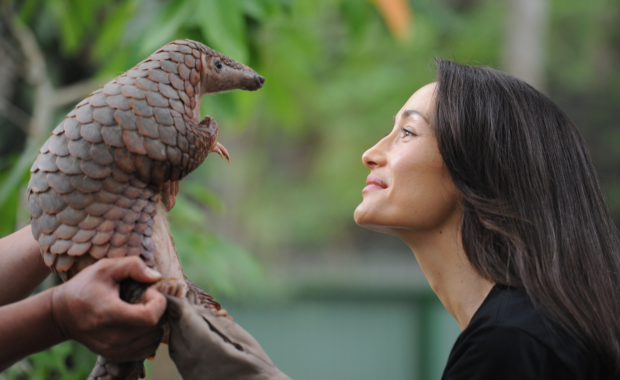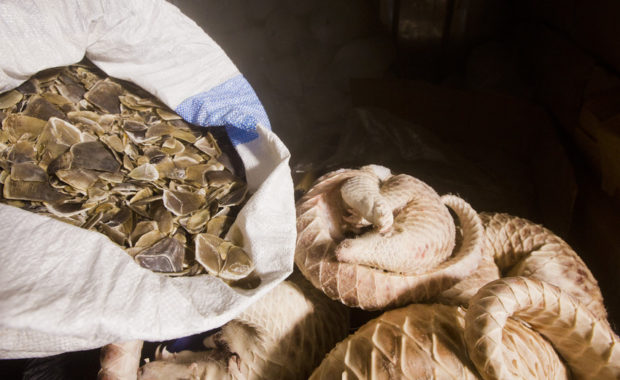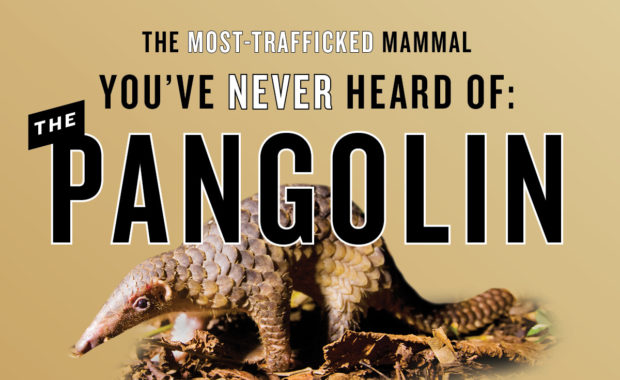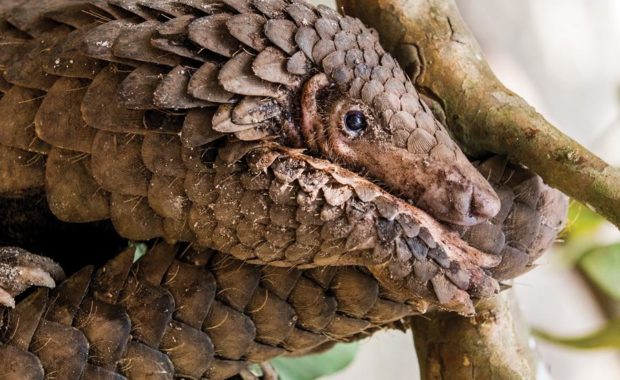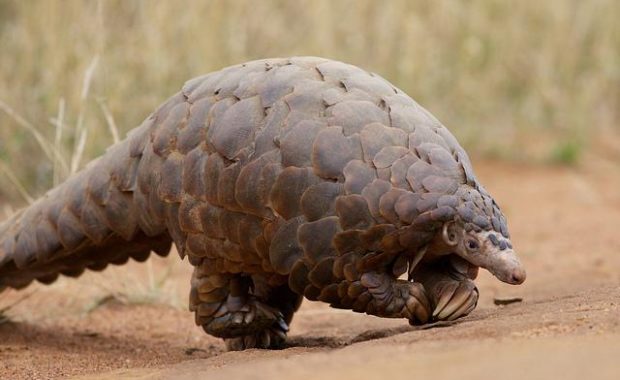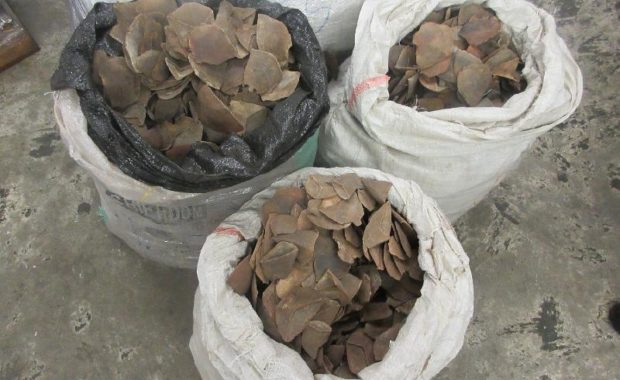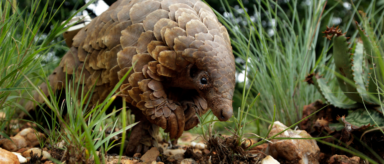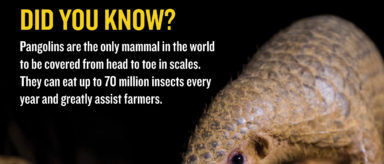Pangolins are the world’s most heavily-trafficked mammals
Pangolins, also known as scaly anteaters, are reclusive and nocturnal animals that roll up into a ball when threatened. They are seldom seen in the wild, and are very hard to raise in captivity. Yet pangolins have become the most heavily trafficked wild mammal in the world. Hundreds of thousands are taken from the wild every year across Africa and Asia. Their meat is considered a delicacy by some in China, Vietnam and parts of Africa, but the greatest threat comes from the use of their scales in Traditional Medicine despite there being no scientific evidence that they convey any medical benefits.
Situation Worsens Despite Protections
In 2016, all eight pangolin species gained full protection from cross-border commercial trade under international law. However, the illegal trade has continued, and in 2019 the International Union for Conservation of Nature (IUCN) declared that the status of three of the eight species had worsened. Today, six species are either endangered or critically endangered.
- 800,000
In the past five years alone, authorities across the world have seized more than 160,000 lbs of pangolin scales, equivalent to over 800,000 animals. The number actually hunted and killed will be many times higher. - 27%
The decline in urban consumption of pangolin meat in Cameroon since WildAid launched its “Say No to Pangolin Meat” campaign in 2022. - 70 million
The number of ants and termites a single pangolin can eat in a year.
Making an impact
WildAid has been on the front lines of the fight for pangolins for nearly a decade, launching its first public awareness campaign in 2016 aimed at eliminating demand for pangolins in the world’s two largest markets – China and Vietnam. We employ behavior change campaigns designed to educate consumers and make consumption of pangolin products socially unacceptable. Enlisting the power of ambassadors like Jackie Chan and Chinese superstar Wang Yibo, and working closely with government and media partners, we have reached some 1.5 billion viewers in these countries, with our messaging showing across dozens of TV networks and on over 16,600,000 video screens in subways, airports, bus stops, hospitals, and shopping centers.
In 2020, China increased protection for the native Chinese Pangolin to the highest level, reinforced a ban on consumption of pangolin meat along with a ban on all wildlife consumption as food, and removed pangolin scales from a list of approved ingredients to be used in Traditional Chinese Medicine. With the upgrade in protection came an increase in efforts to understand pangolins, particularly through research and monitoring.
As more infrared camera monitoring projects roll out in pangolin habitats across the country, more “surprise shots” of Chinese pangolins are being captured. These images reveal an improvement in habitat conditions and an uptick in their numbers in the wild! In order to bring awareness to this initiative, WildAid ambassador Wang Yibo recently joined us on a field mission to help set up some of these cameras personally. We documented his journey in a short film that highlights China’s efforts to bring back their pangolins, aiming to inspire viewers around the world to become pangolin champions. The premiere of this film in China in August 2024 attracted 5.1 million live-streaming viewers.
At the same time, traditional Chinese Medicine practitioners, researchers, educators, and distributors from around the world have launched a new initiative to preserve global biodiversity by committing themselves to abstain from using endangered species in their healing practices. Meanwhile, in China, 55% of practitioners responding to our 2023 survey indicated a willingness to try medications containing alternative ingredients to pangolin scales in their practice.
However, these optimistic signs should not obscure the fact that significant loopholes in policy and enforcement remain in China, and scales are still widely used and freely advertised by pharmaceutical companies.
With a sharp decline in the availability of pangolins in Asia, traffickers have largely turned their focus to sourcing pangolins and their scales from Africa. Hunters and poachers have turned from their traditional role of killing pangolins for food (bushmeat) to actively hunting to satisfy the demand from Asia. Around 90% of the pangolin scales seized since 2015 originated from Africa, with over 128 tonnes intercepted in 2019 alone.
Cameroon is a major source country for pangolin scales, while Nigeria has proven to be a major transit hub for the trafficking of pangolin scales from Africa to Asia.
With this in mind, WildAid has carried out intensive campaigns in Cameroon and Nigeria aimed at raising awareness about the plight of pangolins.
In Cameroon, our campaign has focused on reducing the urban consumption of pangolin meat, which has reached unsustainable levels. The “Say No to Pangolin Meat” campaign has been backed by some of Cameroon’s leading musicians, footballers, and traditional leaders, and has achieved remarkable results since its launch in 2022.
Awareness of the law banning the capture and killing of pangolins has more than doubled in the past two years, with 62% of city dwellers correctly saying that all pangolin species are protected in 2024, up from 29% in 2022.
In the cities and towns of Yaoundé, Douala, Ebolow,a and Mbalmayo, the number of people who said they consume pangolin meat once a month or more frequently fell to 10.3% in 2024, down from 14.1% in 2022. That’s a decline of 27%.


